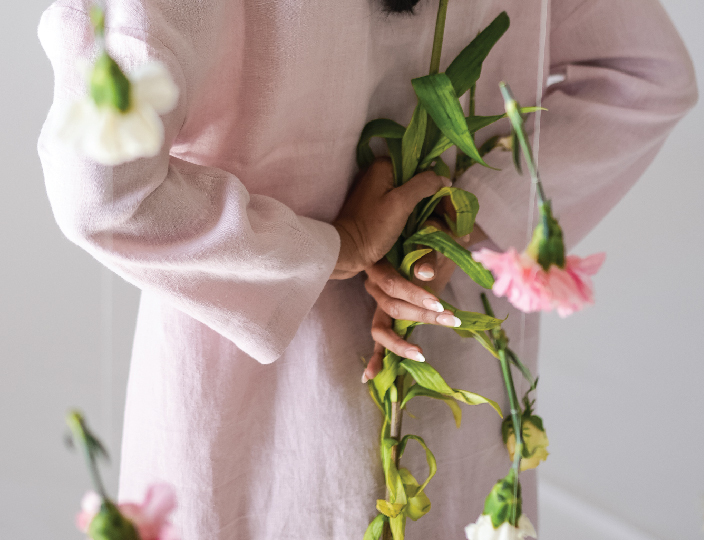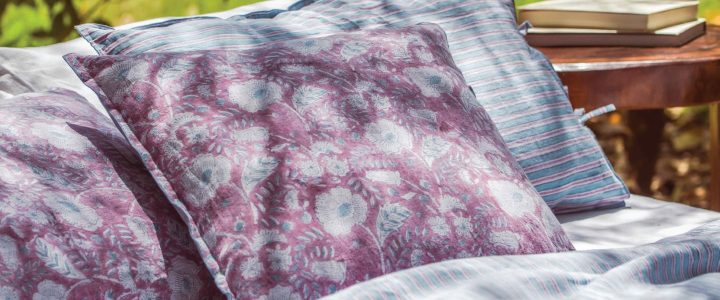A serene slumber night is what most people aim to achieve. Whereas multiple factors are in play to help you with this, the humble duvet cover takes centre stage. Let’s explore its understated importance and help you choose the right duvet cover material for your bedding.
Why Choosing the Right Fabric for Duvet Covers Matters?
The fabric that envelops you in a nightly embrace is not just a mere covering but an extended-expression of your sensibilities. It becomes a silent whisper of luxury that lingers through the night. The importance of this nocturnal companion goes beyond mere aesthetics and invites you to an intimate affair with your nightly sanctuary.
Choosing the right duvet cover material for this poetic ensemble is no less than art. It extends beyond the echo of your desires and allows you to partake in this symphony. Let us take you through the significance of choosing the Best fabric for duvet covers for a night of comforting embrace.
Linen Duvet Covers: A Tale of Breathability and Elegance
Weaving the linen story, you will experience a fresh air of breathability and comfort. The ethereal durability of linen whispers tales of eco-friendly opulence. Crafted in finesse, the linen duvet covers are not mere bedding; they are the projection of your refined taste.
So let’s discuss more on what makes linen the most comfortable duvet cover material and why people resonate with its language of sophistication and understated elegance.
Pros of Linen Duvet Covers
- Breathability and Temperature Regulation: The natural texture of linen offers unparalleled breathability and temperature regulation properties. Its loose weaves allow you to keep your cool, even in the most sultry of days. No wonder it is also known as the best duvet cover material for hot sleepers during summer.
- Durability and Maintenance: The durability of linen is a testament to its timeless allure, weaving tales of longevity into the fabric of your nightly escapades. The more you use it, the softer it gets. And it is super easy to maintain as well.
- Eco-Friendly and Sustainable: Linen’s harmonious blend with nature whispers sweet nothings that resonate with your desire for sustainable elegance and make it the best fabric for duvet cover.
Cons of Linen Duvet Covers
- Initial Stiffness: Initially stiff and crisp, the softness of linen unfolds with every use and wash, much like the blossoming of a tender love.
- Higher Price Point: The higher price point of linen might be a step back initially, but in the long run, it can become a healthy investment into your dreams.
Read More: Why Is Linen So Expensive: Is Splurge Truly Worth Every Penny?
Cotton Duvet Covers: A Symphony of Versatility
Cotton sways gracefully with every movement. Its breathability and comfort are known by many. Suitable for all seasons, cotton is like a versatile companion. Yet, like any masterpiece, it displays vulnerability and is prone to offering limited warmth.
So, let us discuss why some people pick cotton duvet covers in this time and age.
Pros of Cotton Duvet Covers
- Simple Comfort: Cotton duvet covers have been widely used to offer simplistic comfort for all households.
- Several Uses: For years, people have chosen cotton as it is easily available and can be used to suit various needs.
- Easy Maintenance: 100% pure cotton offers effortless maintenance over a substantial amount of time.
Cons of Cotton Duvet Covers
- Prone to Wrinkles: Cotton’s wrinkles remind us that perfection has its own imperfections, which can sometimes become difficult to deal with.
- Limited Warmth: The warmth is present in all seasons but not in the comforting embrace that linen offers time and again.
- Lost Charm Over Time: Although cotton stands the test of time, it does, however, lose its character and shows signs of aging after long use.
Microfiber Duvet Covers: The Prelude to Affordability and Purity
Microfibre duvets offer a joyful blend of affordability and purity, sweeping you into a cocoon of ease. Yet, in this melody, you will see several ups and downs.
Pros of Microfiber Duvet Covers
- Affordable: Microfibre makes for an affordable and second-best fabric for duvet covers without compromising on the aesthetic, linen-like appeal.
- Purity: The purity of microfiber is an ode to sensitive souls and promises a hypoallergenic bliss for those of you looking for serenity.
- Easy to Clean: The ease of cleaning that this fabric offers becomes a practical winner of convenience, especially in cases of washing duvet inserts and covers.
Cons of Microfiber Duvet Covers
- Less Breathable: Here, breathability takes a softer note, making it difficult for you to enjoy a serene night of sound sleep.
- Shorter Lifespan: The lifespan of microfiber offers a bittersweet reminder that beauty sometimes fades quicker than expected.
Silk Duvet Covers: A Story of Luxury and Bliss
The silken stories offer a luxurious sensation that envelopes you in regal opulence. The chosen fabric by noblemen, silk bedding, was a pride to own. However, the delicate nature and the weighty price tag of silk turned it into an exclusive commodity.
Pros of Silk Duvet Covers
- Luxurious Feel: The feel that silk offers is nothing short of luxurious, a tactile indulgence that elevates your slumber to regal heights.
- Excellent Temperature Regulation: Temperature regulation in silk is a boon that adapts to your body’s desires, ensuring comfort throughout the night.
- Hypoallergenic in Nature: Silk, in its regal splendour, also wears the crown of hypoallergenic purity, catering to the most delicate of sensitivities.
Cons of Silk Duvet Covers
- Delicate and High-maintenance: In the silk virtue, high maintenance is the price you pay for the allure of opulence. Easily ruined and required round-the-clock care, silk fabrics are reserved for royalty.
- Pricier than All: The cost of silk, an unspoken acknowledgment of its regal lineage, is suitable only for the esteemed connoisseurs of elegance.
Flannel Duvet Covers: The Warm Embrace of a Winter Evening
Flannel’s soft texture weaves a warm embrace around you. Ideal for cold climates, this duvet of warmth and cosiness creates a haven for frosty nights. However, the less breathable nature confines it to the winter solstice, leaving the warmer seasons yearning for its presence.
Pros of Flannel Duvet Covers
- Warmth and Cosiness: The warmth of flannel is an embrace, a soft, tender touch that cocoons you in comfort, making it an ideal companion for chilly nights.
- Ideal for Cold Climates: Flannel, the hero of the winter sonata, shines brightest in cold climates, creating a sanctuary around you where winter’s chill cannot breach.
Cons of Flannel Duvet Covers
- Less Breathable: As the days get hotter, you are reminded that the warmth of flannel is a cocoon that is best suited for the frosty caress of winter.
- Limited Use in Warmer Seasons: The limitations of flannel duvets emerge in the warmer seasons, where their comforting symphony might be too intense for the gentle breezes of spring and summer.
Factors to Consider When Choosing Best Duvet Cover Material
- Breathability: You don’t want to wake up feeling suffocated in the middle of the night, right? So the best way to avoid this is by making sure that your duvet fabric is breathable in nature and allows air to pass through. This will keep you comfortable in all seasons and settings.
- Warmth: Snuggling up in your cozy duvet is a feeling to cherish. But what happens when your super good-looking duvet fails to comfort you and keep you warm throughout the night?
While picking a duvet for your bedroom, make sure that the material you choose is inherently warm and cozy. It is the ideal thing to look for in winter. If you are looking for a duvet for all seasons, pick one that transitions effortlessly between the months. Linen and cotton are some of the best fabrics for duvet covers that keep you warm in winter and cool in summer.
- Weight of the Fabric: You don’t want to feel burdened under the weight of a heavy duvet, do you? To avoid this and yet stay warm, pick lightweight materials with a higher thread count. This will ensure that you are all snuggled up without struggling to move around in your bed.
- Feel of the Fabric: A serene sleep is the dream of many, and the best way to get that is to switch to a gentle and caressing fabric. Soft fabrics like linen, silk, and cotton pamper your skin and cuddle you in a gentle embrace. The softer the fabric, the more heavenly the sleep. Trust us!
- Longevity and Durability: You would not go around changing your duvets every year now? So why not invest in a timeless classic that will comfort you for the rest of your life? Organic, sustainable fabrics offer you profound comfort and last for several years. Their initial price tag might seem unaffordable, but in the long run, their benefits will outnumber the value you pay.
- Final Look: Last but not least, the final look of your duvet is also what matters a lot. While comfort and affordability go hand in hand, the visual appeal of your duvet should create an inviting atmosphere for you to cosy up and unwind after a long, chilly day.
Which Duvet Cover Material Reigns Supreme in Softness?
Investing in a duvet cover made from one of these soft materials is a commitment to elevating your sleep experience. There is a soft duvet cover material to fit every taste. Whether you prefer the classic luxury of Egyptian cotton, the eco-friendly allure of bamboo viscose, the timeless elegance of linen, or the affordability of microfiber. Embrace the comfort and transform your bedroom into a sanctuary of relaxation with the softest duvet cover that speaks to your unique taste and style.
- Linen: A unique combination of breathability and sophistication may be found in linen duvet covers. Recognized for its organic feel and effortless style, linen becomes softer with each wash, resulting in a comfortable and welcoming sleeping surface.
- Egyptian Cotton: Known for its outstanding quality, Egyptian cotton is still a popular option for plush duvet coverings. This material offers a smooth, long-lasting fabric with long staple strands that deliver unparalleled comfort for your senses.
- Supima Cotton: Like Egyptian cotton, Supima cotton is distinguished by its exceptionally long staple fibers, which provide a smooth and luxurious feel. Supima cotton duvet covers promise a comfortable retreat night after night with its opulent feel that endures.
- TENCEL™ Lyocell: TENCELTM Lyocell duvet covers offer a luxurious and eco-friendly bedding choice. This substance, which is made from wood pulp, is highly valued for its moisture-wicking abilities, silky texture, and environmental friendliness. Savor the velvety feel of TENCELTM Lyocell for a guilt-free, incredibly smooth slumber.
- Microfiber: Microfiber duvet covers are a sensible option because of its velvety texture and reasonable price. The silky surface produced by the incredibly tiny fibers emulates the opulence of more costly materials. For people looking for comfort and convenience combined with ease of maintenance, microfiber is a great choice.
- Flannel: Warm and silky in texture, flannel duvet covers are perfect for colder climes. Usually made of cotton, the unique brushing technique intensifies its softness to provide a warm, insulating duvet cover that envelops you on frigid evenings.
Read More: Sustainable Fashion on Rise: Why Eco-Friendly Clothing is the Future?
Conclusion
Each material we have discussed plays a unique role in the serenity of your sleep. When making your final pick, consider the factors of breathability, durability, elegance, and, most importantly, comfort. In making an informed decision, choose the material that will weave seamlessly into your dreams and resonate with your comfort.


